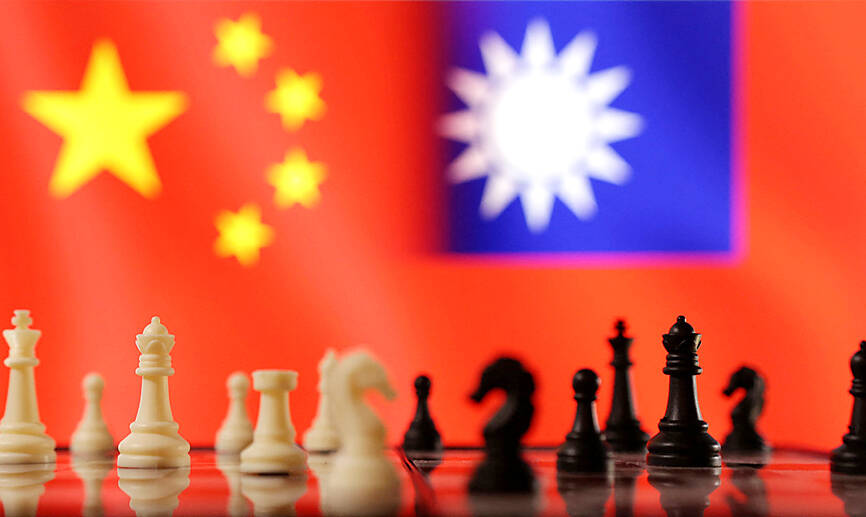National security education should be enhanced and penalties for treason should be increased to counteract pervasive Chinese infiltration threats, said Liu Te-liang (劉德良), former director-general of the Military Intelligence Bureau.
Up to 60 percent of the 159 cases of Chinese espionage uncovered by the National Security Bureau (NSB) in the past few years involved serving or retired military personnel, Liu wrote in the online Cross-Strait Situation Analysis newsletter (兩岸情勢研析通訊) published by the Democratic Progressive Party’s China Affairs Department.
While the case count reflects the military’s dedication to combating espionage, it also indicates that even more spies might be lurking in government agencies and industry, he wrote.

Photo: Reuters
Chinese “united front” warfare is often disguised as cross-strait exchanges, with Beijing’s agents seeking Taiwanese who they believe would help them, he said.
“United front” tactics and espionage should not be conflated, although they are not entirely distinct, he said.
At least 5,000 Beijing-backed spies had infiltrated Taiwan by 2007, so the number has no doubt risen a lot over the past 18 years, Liu said, adding that people should be alert regardless of what the actual number might be.
Common infiltration channels are criminal enterprises, illegal banking operations, front companies, temples and civic groups, Liu said, citing government reports.
However, social venues are an easily overlooked route, with agents known to use hotels, bars, dance halls, KTV parlors and erotic teahouses to lure Taiwanese into espionage work, he said.
Seduction is a common tactic in international espionage, so the NSB should warn people about its use alongside its warnings about bribes, Liu wrote, citing the example of former army major general Lo Hsien-che (羅賢哲), who was coerced into spying for China with photographs of him engaging in sex.
Education on ways to counter espionage should be stepped up in the military and at government agencies, as well as in broader society, to increase awareness, he said.
Moreover, regulations should be amended to increase the penalties for treason, which should at least be more severe than those for corruption, he said.
The public and media should support national security authorities instead of discouraging them with relentless criticism, he added.
People should establish healthy life and work habits, and reduce unnecessary social activities by staying away from hotspots of spy recruitment, he said.
Anyone involved in national security affairs can be targeted, regardless of their hierarchical level, he added.
Drivers, assistants, office clerks and staff to officials in the core decisionmaking circle are all potential targets of Chinese spies, he wrote.
National security can only be protected by increasing awareness and refining regulations, as China is expanding the scope of its infiltrations from government agencies to critical institutions such as Taiwan Semiconductor Manufacturing Co, Academia Sinica and the Chungshan Institute of Science and Technology, Liu said.

The manufacture of the remaining 28 M1A2T Abrams tanks Taiwan purchased from the US has recently been completed, and they are expected to be delivered within the next one to two months, a source said yesterday. The Ministry of National Defense is arranging cargo ships to transport the tanks to Taiwan as soon as possible, said the source, who is familiar with the matter. The estimated arrival time ranges from late this month to early next month, the source said. The 28 Abrams tanks make up the third and final batch of a total of 108 tanks, valued at about NT$40.5 billion

Two Taiwanese prosecutors were questioned by Chinese security personnel at their hotel during a trip to China’s Henan Province this month, the Mainland Affairs Council (MAC) said yesterday. The officers had personal information on the prosecutors, including “when they were assigned to their posts, their work locations and job titles,” MAC Deputy Minister and spokesman Liang Wen-chieh (梁文傑) said. On top of asking about their agencies and positions, the officers also questioned the prosecutors about the Cross-Strait Joint Crime-Fighting and Judicial Mutual Assistance Agreement, a pact that serves as the framework for Taiwan-China cooperation on combating crime and providing judicial assistance, Liang

A group from the Taiwanese Designers in Australia association yesterday represented Taiwan at the Midsumma Pride March in Melbourne. The march, held in the St. Kilda suburb, is the city’s largest LGBTQIA+ parade and the flagship event of the annual Midsumma Festival. It attracted more than 45,000 spectators who supported the 400 groups and 10,000 marchers that participated this year, the association said. Taiwanese Designers said they organized a team to march for Taiwan this year, joining politicians, government agencies, professionals and community organizations in showing support for LGBTQIA+ people and diverse communities. As the first country in Asia to legalize same-sex

MOTIVES QUESTIONED The PLA considers Xi’s policies toward Taiwan to be driven by personal considerations rather than military assessment, the Epoch Times reports Chinese President Xi Jinping’s (習近平) latest purge of the Chinese People’s Liberation Army (PLA) leadership might have been prompted by the military’s opposition to plans of invading Taiwan, the Epoch Times said. The Chinese military opposes waging war against Taiwan by a large consensus, putting it at odds with Xi’s vision, the Falun Gong-affiliated daily said in a report on Thursday, citing anonymous sources with insight into the PLA’s inner workings. The opposition is not the opinion of a few generals, but a widely shared view among the PLA cadre, the Epoch Times cited them as saying. “Chinese forces know full well that